
Sydney Francis Barnes was an English professional cricketer who is regarded as one of the greatest bowlers of all time. He was right-handed and bowled at a pace that varied from medium to fast-medium with the ability to make the ball both swing and break from off or leg. In Test cricket, Barnes played for England in 27 matches from 1901 to 1914, taking 189 wickets at 16.43, one of the lowest Test bowling averages ever achieved. In 1911–12, he helped England to win the Ashes when he took 34 wickets in the series against Australia. In 1913–14, his final Test series, he took a world record 49 wickets in a Test series, against South Africa.

Albert Edwin Trott was a Test cricketer for both Australia and England. He was named as one of the Wisden Cricketers of the Year in 1899. He is believed to be the only batsman to have struck a ball over the top of the Lord's Pavilion. He is also one of only two players to take two hat-tricks in the same first-class innings, the other being Joginder Rao. Despite his notability, having played in 375 first-class matches including 5 Tests, he was almost penniless when he killed himself at the age of 41.

Alfred Percy "Tich" Freeman was an English first-class cricketer. A leg spin bowler for Kent County Cricket Club and England, he is the only man to take 300 wickets in an English season, and is the second most prolific wicket-taker in first-class cricket history.
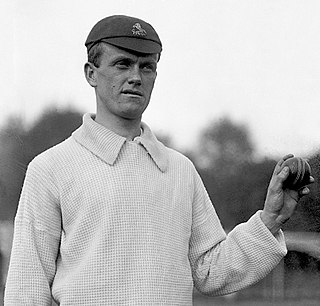
Colin Blythe, also known as Charlie Blythe, was an English professional cricketer who played Test cricket for the England cricket team during the early part of the 20th century. Blythe was a Wisden Cricketer of the Year in 1904 and took more than 2,500 first-class wickets over the course of his career, one of only 13 men to have done so.

Arthur Webb Mold was an English professional cricketer who played first-class cricket for Lancashire as a fast bowler between 1889 and 1901. A Wisden Cricketer of the Year in 1892, he was selected for England in three Test matches in 1893. Mold was one of the most effective bowlers in England during the 1890s but his career was overshadowed by controversy over his bowling action. Although he took 1,673 wickets in first-class matches, many commentators viewed his achievements as tainted.
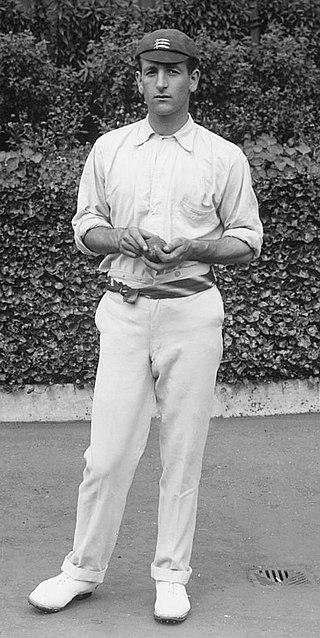
Francis Alfred Tarrant was an Australian cricketer whose first-class career spanned from 1899 to 1936, and included 329 matches.
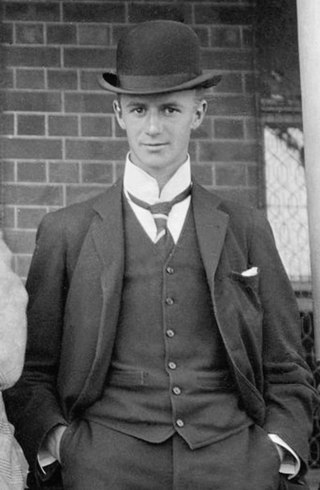
Charles Lucas Townsend was a Gloucestershire cricketer. An all-round cricketer, Townsend was classically stylish, left-handed batsman, who was able to hit well despite his slender build. His off-side strokes were particularly effective, and his driving allowed him to score at a consistent pace throughout his major innings. In his younger days Townsend was also a spin bowler, who relied chiefly on a big break from leg but could also turn the ball the other way. He was often extremely difficult on sticky wickets but very rarely effective on good ones.

Schofield Haigh was a Yorkshire and England cricketer. He played for eighteen seasons for Yorkshire County Cricket Club, for England from the 1898/99 tour to 1912, and was a Wisden Cricketer of the Year in 1901.
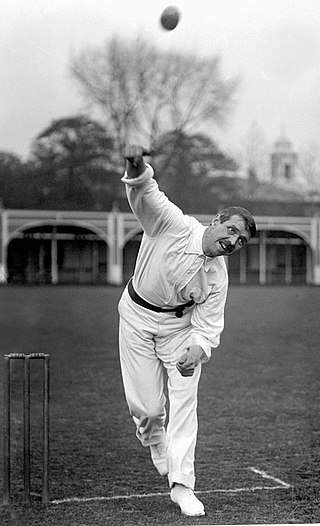
Albert William Hallam was an English off spin bowler who is primarily remembered, along with Thomas Wass, for giving Nottinghamshire an astonishing win in the County Championship of 1907. They did not lose a single match and managed to win fifteen out of nineteen games in which a ball was actually bowled. This is the highest proportion of wins by an undefeated side and the third highest proportion of wins in County Championship history – and the two higher figures were in very dry summers with almost no rain interruptions.

James Michael Anderson, also known as Jimmy Anderson is an English cricketer who played for England. He is currently serving as the fast bowling mentor of the England cricket team. Widely acknowledged as one of the greatest bowlers in the history of the sport, he holds the record for the most wickets taken by a fast bowler in Test cricket (704). Anderson was a member of the England team that won the ICC Men's T20 World Cup in 2010. In February 2023, he became the oldest player to top the ICC men's Test bowling rankings. and is one of the few fast bowlers to play at Test match level into his forties.
Philip John Newport is a former English first-class cricketer, who played primarily as a seam and swing bowler. Newport was a stalwart of Worcestershire County Cricket Club for most of the 1980s and 1990s, and played a key part in the county's triumphs in the late 1980s. Newport played in three Test matches for England between 1988 and 1991. He was born at High Wycombe in 1962.
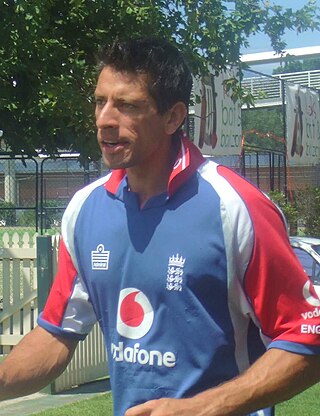
Sajid Iqbal Mahmood is a former English cricketer, who played all formats of the game. He is a right-arm fast-medium bowler who played international cricket for England and county cricket for Lancashire and Essex.

Leonard Charles Braund was a cricketer who played for Surrey, Somerset and England.
Walter Scott Lees was a Surrey and England cricketer who played in five Test matches against South Africa in 1906. On his debut, he took five wickets in the first innings in Johannesburg.

Charles Augustus Ollivierre was a Vincentian cricketer who represented the West Indies in matches before they attained Test match status. Born in St Vincent, Ollivierre initially played first-class cricket for Trinidad; he was selected to tour England with the West Indies team in 1900. He later qualified to play first-class cricket for Derbyshire between 1901 and 1907, becoming the first black West Indian to play for an English county. Ollivierre was reasonably successful in county cricket and had a reputation as a stylish batsman. However, he dropped out of first-class cricket after 1907 owing to eye trouble.

Brigadier Arthur Jervois Turner, was an English cricketer, rugby union player and British Army officer. A right-handed batsman, right-arm underarm medium pace bowler and occasional wicket-keeper, he played first-class cricket for various teams between 1897 and 1914, predominately for Essex. He also played for the Egypt national cricket team. His other sporting interests included Rugby Union, and he played for Blackheath F.C. and Kent at that sport.
Henry John Berridge Preston, known also as Harry Preston, was an English professional cricketer who played for Kent County Cricket Club between 1907 and 1913. He also played in the Lancashire League, and in Scotland where he also coached, and represented Scotland. He was born in Bareilly in India in 1883 and died, aged 80, in Hastings in 1964.

Reece James William Topley is an English international cricketer who plays for the England cricket team in white ball cricket as a left-arm fast medium bowler. He plays for Surrey in domestic cricket. Topley debuted for England in August 2015 against Australia, and represented the team at both the 2016 ICC World Twenty20 and 2023 Cricket World Cup. He plays for the Royal Challengers Bangalore in the Indian Premier League.
Harry Smyth Goodwin was a cricketer of the nineteenth century, born in Glamorgan, Wales but playing for Gloucestershire between 1896 and 1907. A right-handed batsman, Goodwin was an alumnus of Rossall School in Lancashire, for whom he played two matches in 1889. He played 31 matches for Gloucestershire, though aside from the 1897 cricket season he often played only a small number of games each year. He scored 564 runs at a batting average of 12.40, and a best of 46. He was later President of Horsham Cricket Club.















